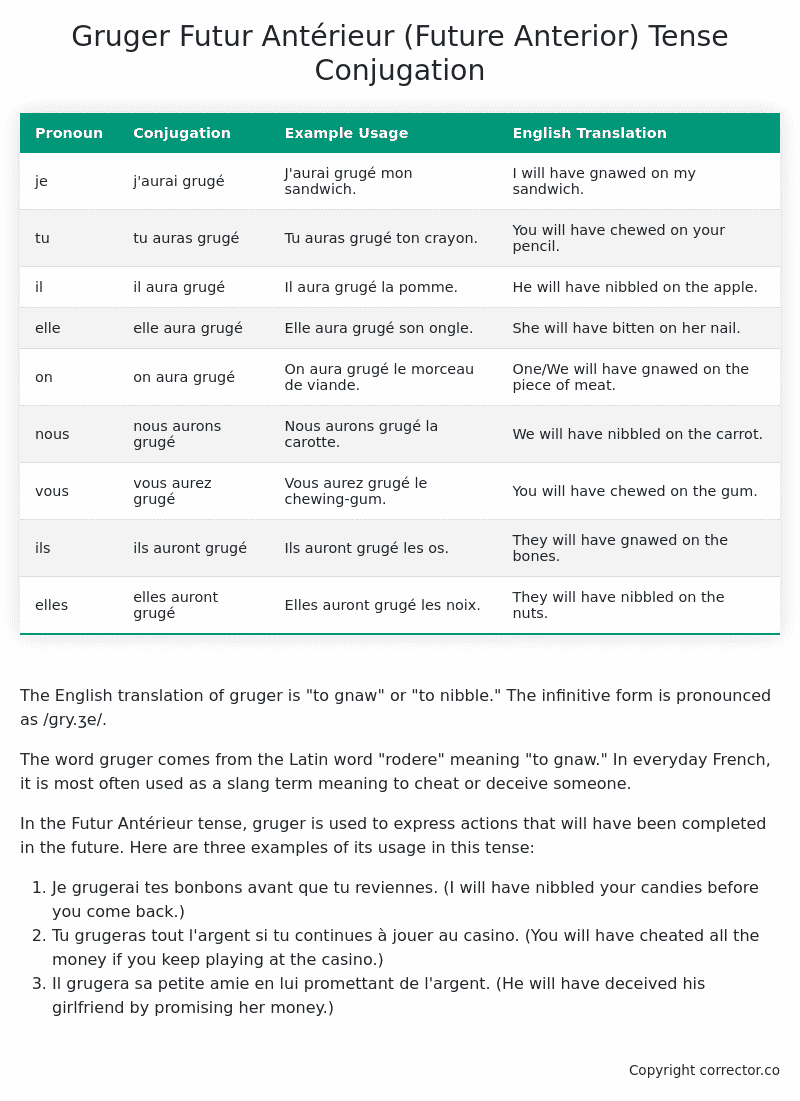Futur Antérieur (Future Anterior) Tense Conjugation of the French Verb gruger
Introduction to the verb gruger
The English translation of gruger is “to gnaw” or “to nibble.” The infinitive form is pronounced as /ɡry.ʒe/.
The word gruger comes from the Latin word “rodere” meaning “to gnaw.” In everyday French, it is most often used as a slang term meaning to cheat or deceive someone.
In the Futur Antérieur tense, gruger is used to express actions that will have been completed in the future. Here are three examples of its usage in this tense:
- Je grugerai tes bonbons avant que tu reviennes. (I will have nibbled your candies before you come back.)
- Tu grugeras tout l’argent si tu continues à jouer au casino. (You will have cheated all the money if you keep playing at the casino.)
- Il grugera sa petite amie en lui promettant de l’argent. (He will have deceived his girlfriend by promising her money.)
Table of the Futur Antérieur (Future Anterior) Tense Conjugation of gruger
| Pronoun | Conjugation | Example Usage | English Translation |
|---|---|---|---|
| je | j’aurai grugé | J’aurai grugé mon sandwich. | I will have gnawed on my sandwich. |
| tu | tu auras grugé | Tu auras grugé ton crayon. | You will have chewed on your pencil. |
| il | il aura grugé | Il aura grugé la pomme. | He will have nibbled on the apple. |
| elle | elle aura grugé | Elle aura grugé son ongle. | She will have bitten on her nail. |
| on | on aura grugé | On aura grugé le morceau de viande. | One/We will have gnawed on the piece of meat. |
| nous | nous aurons grugé | Nous aurons grugé la carotte. | We will have nibbled on the carrot. |
| vous | vous aurez grugé | Vous aurez grugé le chewing-gum. | You will have chewed on the gum. |
| ils | ils auront grugé | Ils auront grugé les os. | They will have gnawed on the bones. |
| elles | elles auront grugé | Elles auront grugé les noix. | They will have nibbled on the nuts. |
Other Conjugations for Gruger.
Le Present (Present Tense) Conjugation of the French Verb gruger
Imparfait (Imperfect) Tense Conjugation of the French Verb gruger
Passé Simple (Simple Past) Tense Conjugation of the French Verb gruger
Passé Composé (Present Perfect) Tense Conjugation of the French Verb gruger
Futur Simple (Simple Future) Tense Conjugation of the French Verb gruger
Futur Proche (Near Future) Tense Conjugation of the French Verb gruger
Plus-que-parfait (Pluperfect) Tense Conjugation of the French Verb gruger
Passé Antérieur (Past Anterior) Tense Conjugation of the French Verb gruger
Futur Antérieur (Future Anterior) Tense Conjugation of the French Verb gruger (this article)
Subjonctif Présent (Subjunctive Present) Tense Conjugation of the French Verb gruger
Subjonctif Passé (Subjunctive Past) Tense Conjugation of the French Verb gruger
Subjonctif Imparfait (Subjunctive Imperfect) Tense Conjugation of the French Verb gruger
Subjonctif Plus-que-parfait (Subjunctive Pluperfect) Tense Conjugation of the French Verb gruger
Conditionnel Présent (Conditional Present) Tense Conjugation of the French Verb gruger
Conditionnel Passé (Conditional Past) Tense Conjugation of the French Verb gruger
L’impératif Présent (Imperative Present) Tense Conjugation of the French Verb gruger
L’infinitif Présent (Infinitive Present) Tense Conjugation of the French Verb gruger
Struggling with French verbs or the language in general? Why not use our free French Grammar Checker – no registration required!
Get a FREE Download Study Sheet of this Conjugation 🔥
Simply right click the image below, click “save image” and get your free reference for the gruger Futur Antérieur tense conjugation!

Gruger – About the French Futur Antérieur (Future Anterior) Tense
Construction
Common Everyday Usage Patterns
Interactions with Other Tenses
For example
Summary
I hope you enjoyed this article on the verb gruger. Still in a learning mood? Check out another TOTALLY random French verb conjugation!


